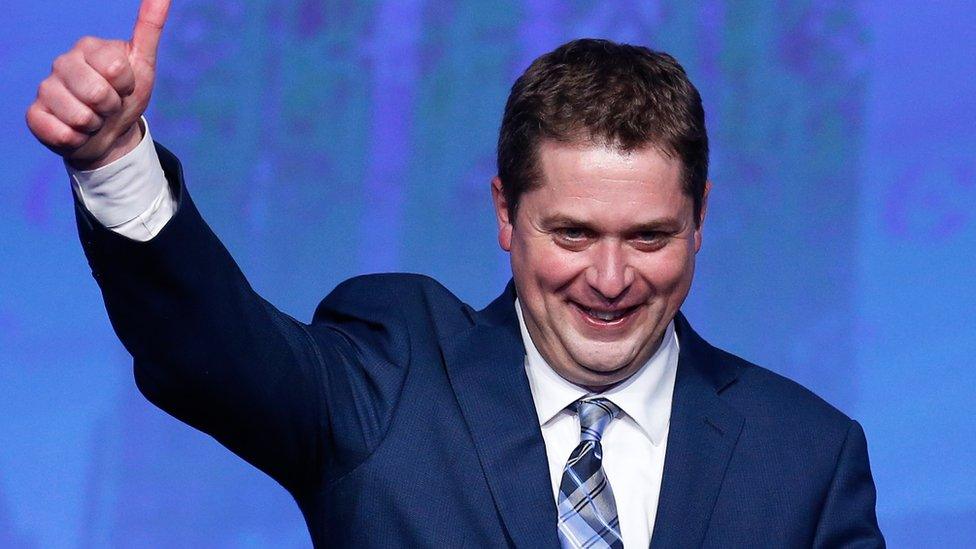Why social issues are a hot topic in Canada's autumn election
- Published
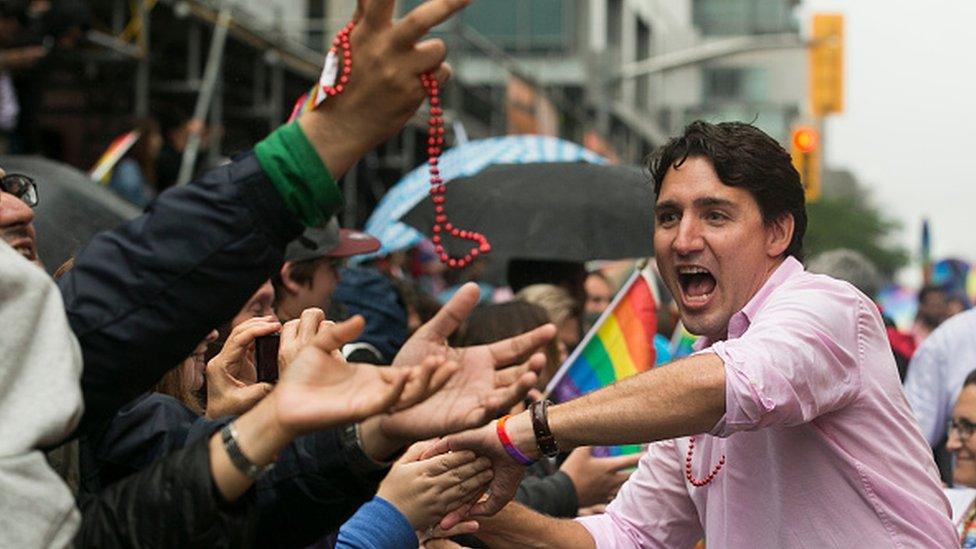
Justin Trudeau has attended pride parades before
Social issues like gay marriage and abortion have taken centre stage in the lead up to Canada's autumn election, as the Liberal Party tries to convince voters that the Conservatives want to backtrack on LGBTQ and abortion rights.
Justin Trudeau's Liberal Party has fired an early salvo against Conservative party leader Andrew Scheer, and his past record on gay marriage and abortion.
But whether it will wound his primary opponent remains to be seen.
A Liberal minister released footage last week of Mr Scheer in 2005 opposing same-sex marriage during a debate in parliament.
Although his remarks have been a matter of public record for some time, the footage renewed concerns that he would let his personal beliefs influence policy decisions.
For days Mr Scheer avoided commenting on his past statements, but on Thursday he gave a press conference where he tried to assuage concerns.
Just before, the Liberals launched another attack, this time with footage taken during the 2017 Conservative leadership contest.
In it, an anti-abortion activist says Mr Scheer has promised him that Conservative MPs who oppose abortion would be allowed to vote with their conscience if the matter were to come up in parliament.
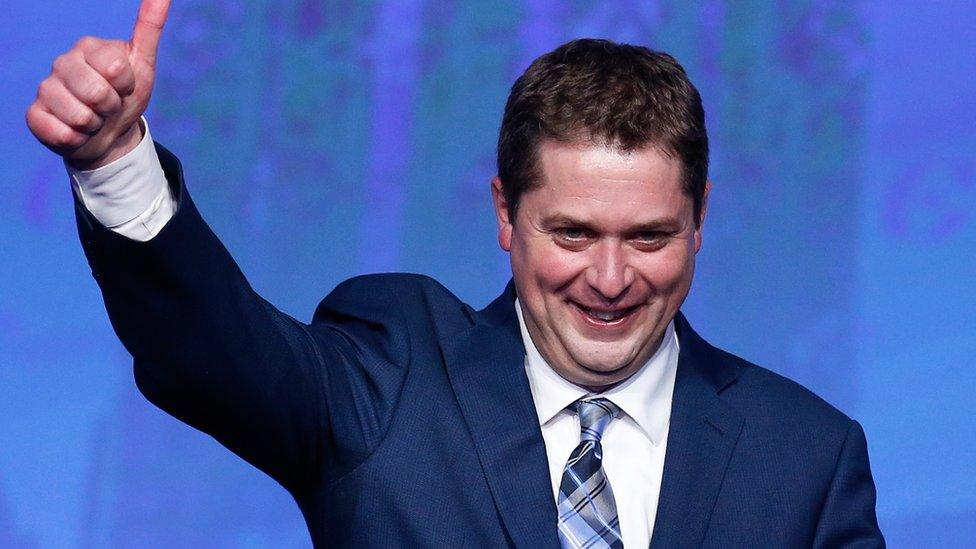
Andrew Scheer celebrates after winning the leadership
During his press conference, Mr Scheer accused the Liberals of "dredging up divisive issues" in order to distract people from Liberal scandals and poor economic policy.
He reiterated that his Conservative Party considered both same-sex marriage and abortion to be "settled law", meaning the party would not seek to make either illegal again.
However, he was a bit hazy on how he would deal with members of his own party who wished to pass socially conservative legislation.
What were Mr Scheer's views on same sex marriage?
In 2005, about a year after Mr Scheer was elected to parliament, he voted against same-sex marriage. He was one of 133 members, from all parties, who voted against the law, which passed with 158 votes.
"There is nothing more important to society than the raising of children, for its very survival requires it. Homosexual unions are by nature contradictory to this," Mr Scheer, who is Catholic, said during a debate on the proposed legislation.
That clip was tweeted out by Liberal public safety minister Ralph Gooddale last week.
Allow X content?
This article contains content provided by X. We ask for your permission before anything is loaded, as they may be using cookies and other technologies. You may want to read X’s cookie policy, external and privacy policy, external before accepting. To view this content choose ‘accept and continue’.

Since 2005, the Conservative Party has largely given up on making same-sex marriage illegal. In 2016, Mr Scheer voted in favour of removing the heterosexual definition of marriage from the party's policy book.
Also in 2016, he voted against a bill to protect gender identity and expression under the Human Rights Act. The bill passed with 248 in favour, including many Conservatives, and only 40 opposed.
What were his views on abortion?
Mr Scheer is personally opposed to abortion, but says he will keep the party's current policy on the issue, which is to not support legislation that would regulate abortion or reopen the debate.
But on Thursday, another Liberal minister tweeted out a video from 2017 that seemed to contradict this promise.
Allow X content?
This article contains content provided by X. We ask for your permission before anything is loaded, as they may be using cookies and other technologies. You may want to read X’s cookie policy, external and privacy policy, external before accepting. To view this content choose ‘accept and continue’.

In the clip, a member of RightNow, an anti-abortion group, tells conservative television host Faytene Grasseschi that Mr Scheer - who was running for party leadership at the time - had promised that he would allow a "free vote" on abortion if it should come up in parliament.
This would mean he would allow his party members to vote with their conscience.
This policy stands in stark contrast to Mr Trudeau, who has said no Liberal Party member is allowed to vote against abortion rights, regardless of personal beliefs.
"The Liberals showed how intolerant they are, and how they don't actually believe in people's rights to hold personal beliefs," Mr Scheer told the Globe and Mail in 2018., external
What does he say now?
On Thursday, after mounting calls for him to clarify his previous statements, Mr Scheer gave a press conference where he accused the Liberal Party of using socially divisive issues to distract from their own scandals.
"Trudeau can't run on his record. He can't possibly defend all his broken promises, massive deficits, tax increases and ethical and corruption scandals," he said.
When asked about his personal views on gay marriage, Mr Scheer said he supported it, legally speaking.
"My personal views are that LGBT Canadians have the same inherent self-worth and dignity as any other Canadian and I will always uphold the law and always ensure they have equal access to the institution of marriage," he said.
He said that while he does not attend pride parades, he supports the community in other ways, such as his motion last year to condemn Russia for its treatment of LGBTQ people.
Justin Trudeau said "it shouldn't be a big thing" for the prime minister of Canada to walk in a gay pride parade
On abortion, his stance was less clear.
He reiterated that he would not reopen the abortion debate.
"I will oppose measures or attempts to reopen this debate and Canadians can have confidence in that," he said.
But he also reaffirmed that individual MPs would be allowed to "express themselves on matters of conscience", which seems to leave the door open for backbenchers to introduce private members bills on the issue.
When asked how he personally would vote if such a bill were to be tabled, Mr Scheer declined to answer the "hypothetical" question.
Why is this an issue now?
There is nothing new about Liberals attacking Conservatives for allegedly being anti-gay or anti-choice.
When a dozen Conservative MPs attended an anti-abortion rally in May, Liberals called on Mr Scheer to defend his position.
Earlier in August, three federal party leaders - Mr Trudeau. NDP leader Jagmeet Singh and Green Party leader Elizabeth May - marched in the pride parade.
Mr Trudeau did not let Mr Scheer's absence go unnoticed.
"It's just unfortunate that there are still some party leaders who want to be prime minister, who choose to stand with people who are intolerant instead of standing with the LGBT community," he said.
Both abortion rights and same-sex marriage are popular in Canada.
A 2017 IPSOS poll found 77% of Canadians supported legal abortion, external. Two-thirds of Canadians also support same-sex marriage, according to a recent Research Co. online survey of 1,000, external.
Mr Trudeau has made progressive issues an integral part of his own brand, and his party's platform. The Liberals' slogan for the campaign, "Choose Forward", speaks to this perception, along with the unwritten implication that to choose Conservative would be a step backward.
- Published18 January 2018
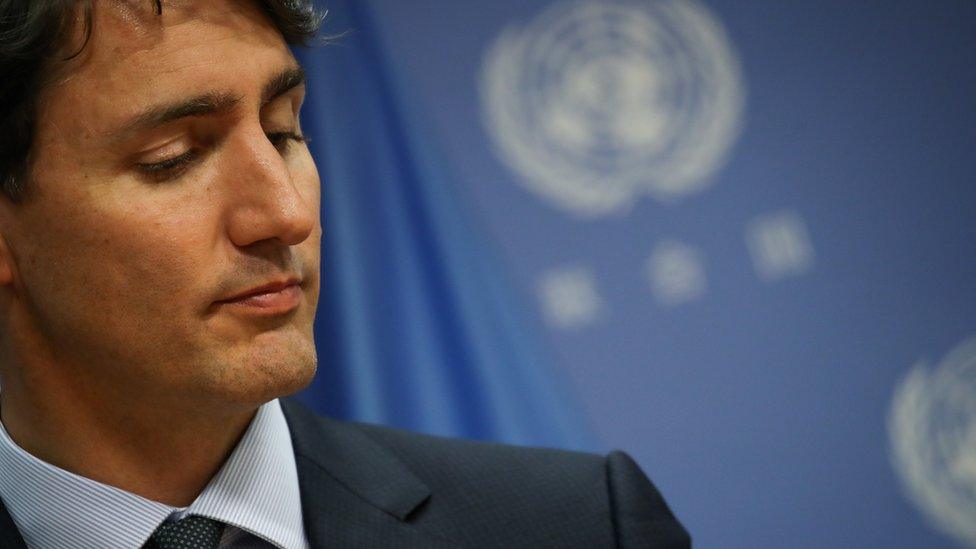
- Published28 November 2017
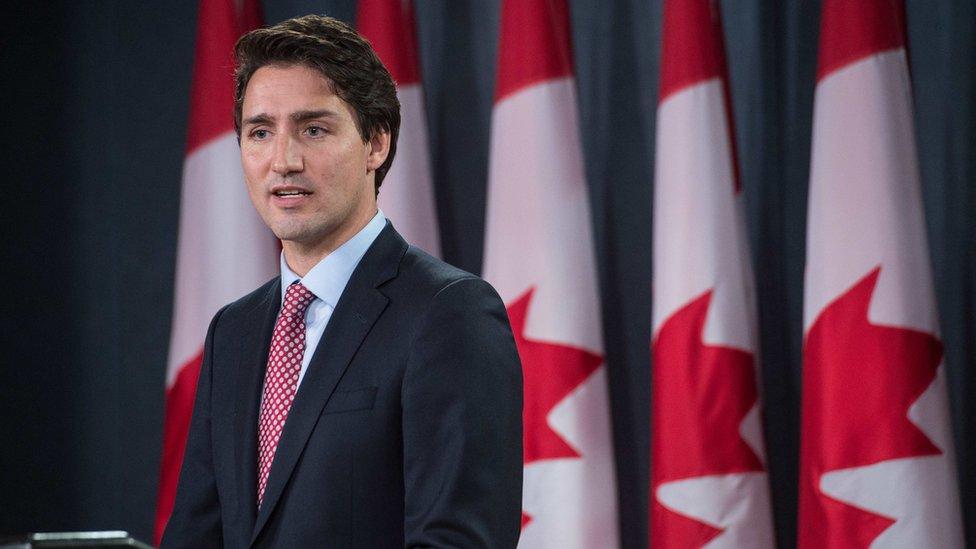
- Published28 May 2017
